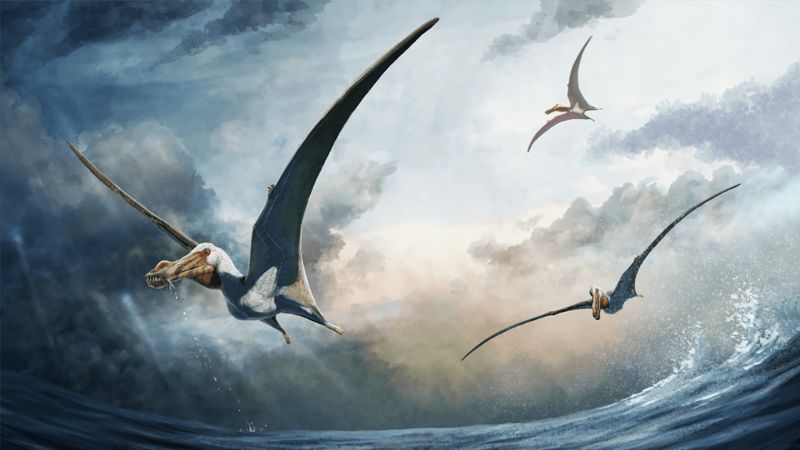Sign up for CNN’s Science of Miracles newsletter. Explore the universe with news of fascinating discoveries, scientific breakthroughs and more.
CNN
–
An amateur paleontologist has discovered a new species of pterosaur, a flying reptile that lived alongside dinosaurs around 100 million years ago.
Kevin Petersen, an avocado farmer and curator of the Kronosaurus Korner fossil museum in northwest Queensland, Australia, discovered a number of fossilized bones in western Queensland in 2021.
These have since been identified as belonging to Haliskia peterseni, a new genus and species of pterosaur, according to a statement from a team at Curtin University in Perth who led the research, published in the journal Scientific Reports on Wednesday.
“With a wingspan of about 4.6 m, Haliskia it would have been a fearsome predator around 100 million years ago, when much of west-central Queensland was underwater, covered by a large inland sea and globally positioned around where the coastline is today southern Victoria,” lead study author Adele Pentland, a PhD candidate at the Curtin School. of Earth and Planetary Sciences, the statement said.
The giant creature was the first vertebrate to evolve the ability to fly and lived alongside the dinosaurs during the Mesozoic Era, which began about 252 million years ago.
“Pterosaurs are winged reptiles that possessed a wing made of a membrane of skin, so in a way they resemble a bat, but they are very different and otherworldly in terms of the shape of their heads, Pentland told CNN.
Haliskia would have hunted fish and squid-like cephalopods in the inland sea, which was also home to large marine reptiles like plesiosaurs and ichthyosaurs, but would have had to come on land to lay its eggs, Pentland told CNN.
It would have been prey for large marine reptiles such as Kronosaurus, whose skull alone would have been 2.4 meters (7.9 feet) long, she added.
“Haliskia wouldn’t have stood a chance against such a beast,” Pentland said.
Fewer than 25 sets of pterosaur remains belonging to four species have been found in Australia since the 1980s, while more than 100 sets have been found in Brazil and Argentina.
In finding Haliskia, Petersen found the most complete specimen of any pterosaur discovered in Australia to date, Pentland said in the statement, praising Petersen for the “careful preparation” of the remains.
“Haliskia is 22 percent complete, making it more than twice as complete as the only other known partial pterosaur skeleton found in Australia,” she said, adding that it includes “complete lower jaws , the tip of the upper jaw, 43 teeth, vertebrae, ribs, bones from both arms and part of a leg.
It also included “very thin and delicate throat bones, showing a muscular tongue, which helped when feeding on fish and cephalopods,” she added.
Pentland told CNN that she “didn’t expect the specimen to be as complete as it was.”
The fossil will join the collection at Kronosaurus Korner, and Petersen said he was thrilled by the find.
“I am thrilled that my discovery is a new species, as my passion lies in helping shape our modern knowledge of prehistoric species,” he said in the statement.
Pentland will then continue to work with regional museums in Australia to describe new fossil material, as well as collaborate with researchers in Brazil, she told CNN.
In May 2023, another study led by Pentland found that pterosaurs took to the skies over Australia as early as 107 million years ago.
Paleontologists came to this conclusion after examining two pieces of prehistoric bone excavated from Dinosaur Cove – a fossil site in the Australian state of Victoria – more than three decades ago.
The specimens turned out to be the oldest pterosaur remains ever recovered from the site, according to the study published in the scientific journal History Biology.
